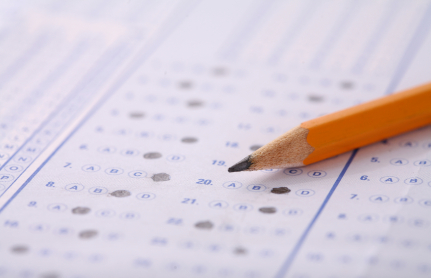Here are some helpful tips that you can follow to get the most out of taking practice exams:
The Setup
- Find a quiet place to take the exam without any distractions.
- Have a pencil and scratch paper readily available by your side.
- Have a watch of clock nearly to easily glance at.
- If you’re taking a non-computer based practice test you find, I recommend printing it out or making copies of it first and circling your answers on those pages, rather than placing your answers on a separate sheet. You’ll learn more this way when you grade yourself, because looking at only the letter of the answer won’t teach you a thing.
- Pretend the exam is the real thing.
During the Practice Exam
- Give yourself 2 hours to complete the exam.
- Read each question carefully. Be sure to answer the correct amount of answers each time (i.e. Choose 3).
- If you get stuck on a particular question, skip it and come back to it later. You might remember new things as the test goes along. If you’re on paper, mark it with a big “M” so you can easily find it later.
- Use your scratch paper. People often forget it’s there during the real exam, so practice with it and use it to your advantage. I like to write things down like charts or “braindumps” related to the particular question I’m looking at.
- Try to stay focused. Two hours is a long time to sit and do one thing. If you need a break, feel free to get up, stretch, or walk around a little. You can do this during the real exam (you must first raise your hand though). Just remember: the clock is ticking.
- If you finish early, go through your answers one more time, making sure you have answered all of the questions you previously skipped.
After your Practice Exam
- Go through the answer key and evaluate your score. If you want to take it a step further, go through each question one-by-one. When you answer correctly, understand how you chose the correct answer.
- If you answer incorrectly, put a big circle around it and analyze the question to understand how you chose the wrong answer. If you don’t understand why, place a big “?” next to it so you’ll know to ask about it later when you have a chance.
- If the reason you answered a question incorrectly was because you misread the question, BOO on you! This should be a reminder of how important it is to read each question carefully. Don’t give yourself a chance to answer incorrectly. Especially watch out for those questions that say “not” or “except”.
- Notice the questions you have answered incorrectly as a whole. Are there any patterns that you can see? Maybe a majority of them have to do with a particular subject, such as the application process. Make note of that, and be sure to really hit those trouble points during your next study session.
For a listing of the best practice exams that you could possibly use to help you study for your LEED exam, please click here.







No Comments Yet